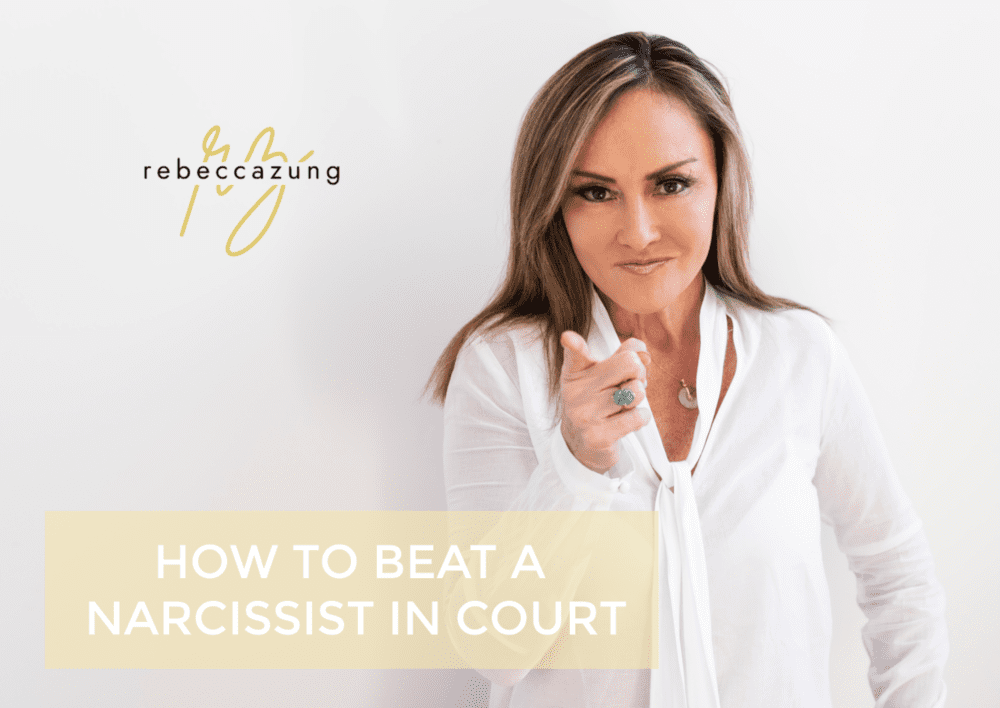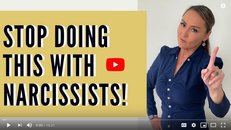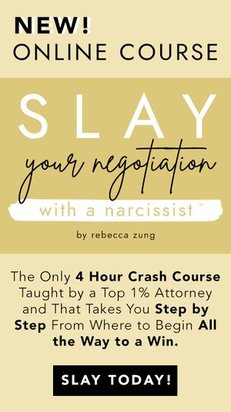
Are you ready to go to court against a narcissist? By the end of this article, you’ll know exactly what you need to do and what you should be thinking about if you’re getting ready to go to court against that narcissist, and especially if you want to win.
Now, if you’re getting ready to go to court with a narcissist, whether it’s divorce court or otherwise, you’re going to want to be fully prepared and you’re definitely not going to want to walk in without having the best possible strategies and tactics at your fingertips because this is going to be no cake walk. The narcissist is going to make it as difficult for you as possible.
First, have everything that’s possible to be in writing be in writing, because narcissists, by their nature are pathological liars. So they are going to lie about things that you’ve said, you didn’t say. Conversations that took place or didn’t take place, what they said or didn’t say. Whatever it is, it’s going to be twisted, it’s going to be manipulated, so you want to make sure, but you can keep everything in writing to the extent that, that’s possible. Ideally, it would be in an email or something like that where you actually have the time stamp on it. You have the date stamp on it, you have the email, who it came from, the email address of who it came from, who it went to, that sort of thing.
Text messages are admissible in court nowadays, but it’s just a little bit more difficult to authenticate them when it comes to evidence in court, so it is better if you can do it via email if possible. The other problem with text messages is that they tend to go away after a certain period of time, and especially if you don’t save them, it’s really difficult to go back and find them. The phone companies don’t even really keep them either. So you’re definitely going to want to make sure that you use email if possible.
If you’re co-parenting, having a co-parenting app such as TalkingParents, or Fayr, or OurFamilyWizard, something like that is always a good idea too. I mean, the bottom line is that they’re going to try to get you away from this writing, they don’t want it to be in writing because they know that it will box them in, and narcissists don’t want to be boxed in. So they’re going to do whatever they can to get you to meet with them, to go against what you’ve said before.
They’re just, “Let’s just meet. We don’t need the writing. We don’t need all these other people around us. Let’s just meet at Starbucks or whatever.” And the reason why they’re doing that is to get you into a place where they can manipulate you again. So by keeping everything in writing as much as possible, you can minimize that problem. Now, the flip side of this, by the way, is for you to remember that every single writing is a potential trial exhibit. So if you don’t want to see it again, then don’t put it in writing. The way I just say it to people is, just imagine the judge is leaning over your shoulder and watching you write that text or that email. And before you hit send, say, “Judge, your honor, is this something that you would want to see?” And if it’s not, then you don’t want to send it.
The second thing that you’re going to want to do is use video protect depositions, and the reason why you’re going to want to do this, and yes, it’s a little bit more expensive, you have to pay for the court reporter, now you have to pay for the videographer, but it goes back again to boxing that narcissist in. If you box them in enough, then they will act like the spoiled, temper tantrum child, and their true colors will show up, and you’ll be able to use that against them down the road. So, just trying to control their behavior using video will definitely help, because if you don’t use video, what they tend to do is do things that don’t show up on the record. Meaning, the court reporter will take down everything that’s actually said in the deposition.
When you look at the deposition transcript, it’ll just say question, blah, blah blah, and sir blah, blah, blah. There’s nothing around it, there’s no description given around it. So if that narcissist is giving you dirty looks, making faces, all the things that they do, and they do, then nothing is taken down. Now, for me as a lawyer, there have been many times where I’ve had to say, “Let the record reflect that so-and-so is making faces at so-and-so.” But, how many times can the lawyer do that over and over again without just constantly interrupting the deposition? So by videoing it, you actually see how they’re responding and how they’re acting. Plus it makes them behave a little bit better because they’re a little less likely to be a complete jackass if there’s a video shining in their face.
Third, focus on your own case. So this is one of the biggest mistakes that I see lawyers make, I see lots and lots of people make, because it’s just natural to want to focus on what’s the other side doing. And all of their flaws and all of their mistakes, and how is he or she getting away with this? And, look at how badly they’re behaving, and isn’t the judge going to see that? And if the answer is maybe, and probably, and yeah, you will want to bring out all of the other bad behavior of the other side, but, just like in football, if all you have is a good defense and you have no offense whatsoever, then you never score any points.
So, you want to make sure that your case is as strong as possible. Focus on your case, make sure that the facts and the supporting documentation, and everything is done to create your case and make sure it’s super strong. And then, for the other side, you create that leverage to help motivate them into wanting to come to the table to potentially have a settlement conversation with you. Or, you have all the points that make them look bad. Yes, anything that shoots their credibility. When people say, “Oh, how are they getting away with this? They’re lying all the time. How are they getting away with this?”
So the thing I want you to remember, here’s a good reality check for you, and that is, who would stop them from getting away with something? The only person who has any power over another human being in the court system is the judge. Not the lawyers, not you, not family members. No one has the power to order someone to do anything other than the judge. And how do you get in front of the judge? Through motions, through hearings, and through trials.
Things have to be filed in the court system and then you have to have a hearing, bring it to the judge’s attention, and only at that point can you potentially reign in their behavior. But while you’re waiting for that time to get in front of the judge, you’re just documenting, you’re keeping track, keeping track, keeping track. So, that’s how you’re building your case.
If you’re dealing with a child custody situation, for example, and the person just never shows up to get the kids, or they show up late, or they constantly change the time. You just document, and document, and document it, and then when it comes time to present that to the court, you have a nice log of exactly what happened and when, what time did they show up, what time did they leave, all of that. So, eventually it will work in your favor, but just remember that you want to keep track of your own case and make sure that that is bolstered as much as possible, and then highlight the weaknesses of the other person as well.
Fourth is what I started to allude to at number three, which is document, document, document. I cannot stress this enough. Keep really careful notes. Have an app open on your phone. Have a journal, a log, whatever you need to do so that wherever you are real time you can be logging what’s happening. And I have won entire cases on these types of logs. Let me tell you, they do work. It is critically important, so make sure that you’re documenting, because what you’re doing is you’re slowly closing in on your narcissist from every angle.
This is war, this is the art of war. And so, you’re building these tactics, and you’re closing in on them from various different angles, and it doesn’t look like you’re doing much until you’ve got them fully surrounded. And that’s when you realize, “Hey, I have them!” Only then is when they’re going to want to start to have a conversation with you about potentially settling the case and not having to go to court, because you know that the main thing about a narcissist is that they don’t want to look back.
Fifth, definitely do very thorough research. Have everything ready to go. Do you need appraisals? Do you need valuations? Do you need a forensic accountant? Do we need to figure out what the person’s true income is by looking at their banking records? Do we need to figure out a lifestyle analysis by looking at credit card statements and bank statements and things like that?
Everything needs to be ready to go. All I’s dotted, all T’s crossed. Don’t leave any stone unturned. Don’t leave anything to winging it because whatever your weaknesses are, wherever there’s that weakness in your case, that’s where they’re going to find you, and that’s what they’re going to jam their foot in and open that door and make it into a big, huge thing.
Also in being prepared, you’re going to want to make sure that you do all the research for the other side. What are they going to argue? What points do they have against me? What leverage do they have against me? And then be ready to answer that. “I anticipated this argument and here’s my response.” Because, if you’re only prepared for your side, then you are only half ready to go.
So make sure that you are ready for both sides, as if you’re preparing for both sides. And one word about leverage, by the way, is makes sure that once you’ve got that leverage, you use it at the most opportune time. Do not give it away too early, do not show it to them before you get to court, because you want to use it when you need it.
Lastly, keep your emotions in check. This is going to be one of the hardest things to do because narcissists know how to push your buttons, and they know how to manipulate you, so they’re going to make faces, they’re going to make little snarky comments, they’re going to say things under their breath. And so, I would totally avoid making eye contact with them in the courtroom. It’s not going to serve you.
Just look at the judge, when you’re testifying just look at the judge. Make sure that you’ve practiced your testimony. I, as an attorney, go over my direct testimony with my clients. If your attorney doesn’t do that as a matter of course, ask your attorney to do that with you, or ask them for the questions and have somebody else practice it with you. You want to just be able to at least control the parts that you can control, which is your direct testimony.
You should basically know what those questions are going to be, that your attorney will be asking you those questions. And be ready with what you’re going to say so that you’re not stumped, and you’re not feeling nervous and anxious. You know exactly, “Okay, this is that question. Here’s how I planned to respond to it.” I mean, of course you’re going to answer truthfully. You just want to be prepared on how you’re going to word your answers, how you going to say it. What things you want to make sure to get in, what things you want to make sure to say, things like that. So, that’s your direct testimony.
Now, as for your cross examination, you should also see if your lawyer will drill you to practice. I know I usually do this as a matter of course. I tell my clients what to expect for cross examination too. I even sometimes get another lawyer in my office to do a mock cross examination with the person and beat them up a little bit, just so that they’re ready, the kinds of questions that I would ask under cross examination, something like that. So the more you can be prepared, the less emotional you will be, the less anxious you will be.
In my program, S.L.A.Y. Your Negotiation With a Narcissist, I explain more about how to be prepared.
If you are dealing with a narcissist and you want to know more about how to communicate with them, come join me at my FREE Webinar, the 3 MUST HAVE Secrets for Communicating with a Narcissist. You can sign up for that RIGHT HERE.














